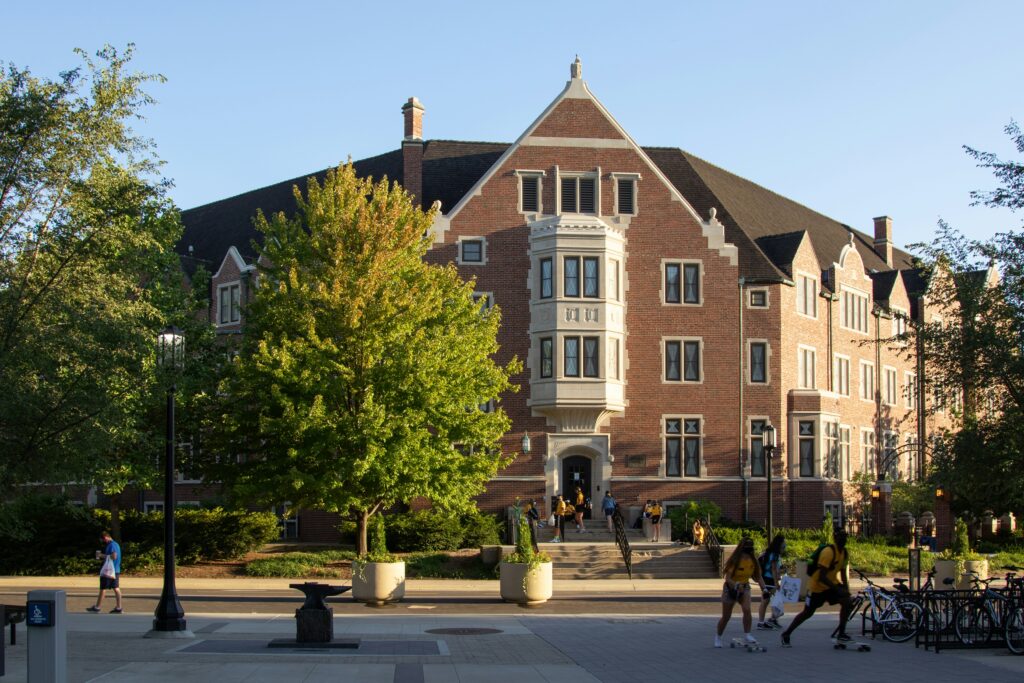- Blog
- > Best Schools
Top Undergraduate Engineering Schools for Research & Careers
- Dr. Rachel Rubin
- | March 25, 2025

Choosing the right engineering school is a major step toward building a successful career in a field that you love. The best undergraduate engineering schools provide a strong foundation in theoretical knowledge, hands-on learning experiences, and cutting-edge research opportunities.
With various engineering fields to explore, such as mechanical engineering, electrical engineering, and chemical engineering, students have many options to specialize in their chosen career paths. This guide, grounded in the latest undergraduate engineering program rankings by university, highlights the best engineering schools known for their academic programs, distinguished faculty, and strong industry connections.
Qualities of Top Engineering Schools
The best engineering schools offer more than just academics. They create an environment that fosters innovation, collaboration, and professional growth. Here are some factors that set these schools apart:
- Accredited Engineering Programs: A strong undergraduate engineering program is accredited by ABET, ensuring a high-quality curriculum that meets industry standards.
- Hands-On Learning: Schools that emphasize experiential learning through labs, internships, and cooperative education programs give students a competitive edge in the job market.
- Cutting-Edge Research: Institutions with well-funded research initiatives allow students to work on real-world engineering problems, from renewable energy to artificial intelligence.
- Industry Connections: Engineering schools with strong ties to major corporations and government agencies help students secure internships and full-time positions.
- Strong Alumni Networks: Graduates from top engineering schools often benefit from an extensive network of professionals who can provide mentorship and job opportunities.
Best Undergraduate Engineering Schools
Undergraduate engineering programs in the best engineering schools share similar traits. If a student wants to be part of a renowned undergraduate engineering program, they better have their sights set high.
1. Massachusetts Institute of Technology (MIT)

Regarded as one of the best engineering schools in the world, MIT offers top-tier undergraduate engineering programs in fields such as aerospace engineering, mechanical engineering, and computer science. MIT’s emphasis on innovation and hands-on learning makes it a top choice for engineering students.
2. Stanford University

Stanford University is home to one of the best undergraduate engineering programs, with strengths in electrical engineering, computer engineering, and materials science. The school’s proximity to Silicon Valley provides unparalleled job opportunities for graduates.
3. University of California, Berkeley (UC Berkeley)

UC Berkeley is one of the top public universities for engineering, offering strong programs in civil engineering, chemical engineering, and electrical engineering. The school is known for its world-class faculty and research initiatives.
4. Georgia Institute of Technology (Georgia Tech)
Georgia Tech consistently ranks among the best engineering schools in the nation. With a focus on hands-on learning and industry partnerships, students gain valuable real-world experience in mechanical engineering, electrical engineering, and more.
5. Carnegie Mellon University

Carnegie Mellon University is renowned for its engineering programs, particularly in computer engineering and robotics. The school’s strong ties to the tech industry make it an excellent choice for students interested in software development and artificial intelligence.
6. University of Michigan, Ann Arbor

The University of Michigan offers some of the best mechanical engineering and electrical engineering programs in the country. Its comprehensive curriculum and strong alumni network provide excellent career opportunities for graduates.
7. Purdue University

Purdue University is known for its premium engineering program, with strengths in aerospace engineering, civil engineering, and chemical engineering. The school provides a blend of theoretical learning and hands-on experience.
8. California Institute of Technology (Caltech)
Caltech offers a rigorous engineering education with a focus on research. The school is particularly strong in electrical engineering, mechanical engineering, and applied physics.
9. University of Illinois Urbana-Champaign

A top public university for engineering, the University of Illinois offers outstanding programs in computer engineering, electrical engineering, and materials science.
10. Rose-Hulman Institute of Technology
Rose-Hulman Institute is one of the best undergraduate engineering schools, specializing in providing students with hands-on learning opportunities in mechanical engineering, electrical engineering, and biomedical engineering.
Engineering Majors and Career Opportunities
The best engineering schools offer diverse engineering majors that lead to exciting career paths. Here are some of the most popular fields for those graduating with an engineering major:
Mechanical Engineering: Focuses on designing, manufacturing, and maintaining mechanical systems. Graduates often work in industries such as automotive engineering and aerospace engineering.
Electrical Engineering: Covers power generation, electronics, and telecommunications. Many electrical engineering graduates find jobs in robotics, renewable energy, and semiconductor manufacturing.
Chemical Engineering: Combines chemistry and engineering to develop industrial processes. Careers in pharmaceuticals, energy, and materials science are common.
Civil Engineering: Involves the design and construction of infrastructure projects such as bridges, roads, and buildings.
Computer Engineering: Merges electrical engineering and computer science to develop hardware and software solutions for computing systems.
Best Undergraduate Engineering Schools by Specialization
Different engineering schools excel in various fields, making it important to choose a program that aligns with your academic interests and career goals. Below is a closer look at some of the best undergraduate engineering schools based on specialization.
Best Mechanical Engineering Schools
The Massachusetts Institute of Technology (MIT) consistently ranks among the top mechanical engineering schools in the world. With state-of-the-art research labs and a strong focus on hands-on learning, MIT provides students with the tools to innovate in areas such as robotics, automotive design, and energy systems. The program emphasizes both theoretical and practical applications, allowing students to work on groundbreaking projects from their first year.
Stanford University offers a highly regarded mechanical engineering program that integrates innovation, entrepreneurship, and advanced research. Located in the heart of Silicon Valley, Stanford provides students with unparalleled access to technology companies, start-ups, and research facilities. The curriculum focuses on product design, biomechanics, and sustainable energy, preparing students for careers in a wide range of industries.
The University of Michigan, Ann Arbor is a powerhouse for mechanical engineering, offering extensive laboratory facilities and strong industry partnerships. Michigan’s program is known for its emphasis on engineering design, computational mechanics, and manufacturing systems. Students benefit from numerous hands-on learning opportunities, including participation in research projects and engineering competitions.
Best Electrical Engineering Schools
MIT leads the way in electrical engineering education, boasting some of the best faculty and research opportunities in the field. The program covers everything from semiconductor technology to artificial intelligence, offering students a chance to work on cutting-edge advancements in robotics, communications, and circuits. MIT’s strong industry connections and research collaborations make it an ideal choice for students looking to push the boundaries of electrical engineering.
Stanford University is another top destination for students interested in electrical engineering, particularly those looking to work in Silicon Valley. The program emphasizes digital systems, microelectronics, and power systems, equipping students with the skills needed to thrive in a rapidly evolving technological landscape. Stanford’s close ties to major tech companies give students access to internships and job opportunities in some of the world’s most innovative firms.
The University of California, Berkeley offers a highly competitive electrical engineering program with a focus on semiconductor technology, communications, and control systems. Students at Berkeley benefit from a rigorous curriculum and a vibrant research environment that encourages innovation. The program’s location in the San Francisco Bay Area provides valuable networking opportunities with leading tech companies.
Best Computer Engineering Schools
Carnegie Mellon University is widely recognized as one of the best schools for computer engineering, particularly in artificial intelligence, cybersecurity, and machine learning. The program blends hardware and software education, ensuring students have a strong foundation in both aspects of computing. With a research-driven approach and strong industry partnerships, Carnegie Mellon produces graduates who are in high demand across the tech industry.
Georgia Institute of Technology, commonly known as Georgia Tech, offers one of the strongest computer engineering programs in the country. The school is known for its emphasis on hands-on research and collaboration with major companies such as Intel, IBM, and Microsoft. Georgia Tech students gain valuable experience through internships, co-op programs, and research opportunities, making them well-prepared for careers in software development, embedded systems, and computer architecture.
The University of Illinois Urbana-Champaign is a leader in computer engineering, with strengths in chip design, high-performance computing, and network security. The program provides students with access to world-class research labs and faculty members who are at the forefront of technological advancements. Many graduates go on to work for top tech firms or pursue graduate studies at prestigious institutions.
Best Civil Engineering Schools
The University of California, Berkeley has long been a top choice for students pursuing civil engineering. The program is particularly strong in structural engineering, environmental sustainability, and urban infrastructure. With faculty who are leaders in their fields and access to cutting-edge research facilities, Berkeley provides students with an exceptional education in civil engineering.
The University of Illinois Urbana-Champaign is another top institution for civil engineering, known for its strengths in transportation systems, construction management, and geotechnical engineering. Students benefit from a curriculum that blends theoretical knowledge with practical application, allowing them to work on large-scale infrastructure projects and sustainability initiatives.
Georgia Tech offers an outstanding civil engineering program that focuses on sustainable development, smart cities, and transportation engineering. The school has strong industry partnerships, providing students with internship and job placement opportunities with major construction firms, government agencies, and environmental organizations.
Best Chemical Engineering Schools
MIT’s chemical engineering program is one of the best in the world, offering students the chance to work on groundbreaking research in biomedicine, energy, and advanced materials. The program emphasizes both theoretical and hands-on learning, preparing graduates for careers in industries ranging from pharmaceuticals to alternative energy.
The California Institute of Technology (Caltech) is known for its rigorous chemical engineering curriculum and small class sizes that provide a personalized learning experience. The program places a strong emphasis on research, with students working closely with faculty on projects related to nanotechnology, biochemical engineering, and materials science.
The University of Minnesota, Twin Cities has built a reputation for excellence in chemical engineering, particularly in process engineering, catalysis, and polymer science. The program offers extensive research opportunities and industry partnerships that help students gain real-world experience before entering the workforce.
Best Aerospace Engineering Schools
Georgia Tech is home to one of the top aerospace engineering programs in the country, with strong ties to NASA, Boeing, and Lockheed Martin. The program covers everything from aerodynamics to propulsion systems, offering students hands-on experience with wind tunnels, flight simulators, and cutting-edge aerospace technology.
The University of Michigan, Ann Arbor has a long history of producing top aerospace engineers. With strengths in space exploration, fluid dynamics, and autonomous flight systems, Michigan provides students with a well-rounded aerospace engineering education. Many graduates go on to work for leading aerospace companies and government agencies.
Purdue University is known for its outstanding aerospace engineering program, which has produced some of the world’s most famous astronauts, including Neil Armstrong. The program offers strong industry connections, state-of-the-art research facilities, and a curriculum that prepares students for careers in both aeronautics and astronautics.
These top undergraduate engineering schools offer specialized programs that provide students with the knowledge and hands-on experience needed to excel in their chosen fields. By selecting a school that aligns with their interests, students can position themselves for successful careers in engineering.
Tips for Getting into the Top Undergraduate Engineering Programs
Gaining admission to the best undergraduate engineering schools takes more than just strong grades. Admissions officers look for well-rounded students with a passion for problem-solving, innovation, and STEM fields. Here are some key strategies to strengthen your application:
Emphasize Math and Science Courses
Engineering programs expect applicants to have a solid foundation in subjects like calculus, physics, and chemistry. Taking AP or IB courses in these areas can demonstrate readiness for rigorous coursework.
Opting to Take the Science Portion of the ACT
For students aiming to get into a top engineering school, demonstrating strong science skills is a key advantage. Beginning in 2025, the ACT Science section will become optional. Many top engineering schools value a well-rounded STEM foundation, and a high science score can highlight your readiness for rigorous coursework.
Participate in STEM Extracurriculars
Join robotics clubs, coding competitions, science fairs, or engineering-related summer programs. Hands-on experience with engineering projects can set you apart.
Gain Research or Internship Experience
Working on research projects or securing internships in engineering-related fields shows initiative and real-world application of skills. Getting to know a mentor with engineering accolades is always a good idea.
Demonstrate Strong Problem-Solving Skills
Whether through competitions like Math Olympiads or independent projects, showcasing your ability to think critically and solve complex problems is a plus. In the essay, you have the opportunity to showcase problem-solving in your extracurriculars or other experiences during high school.
Write a Standout Essay
Use your personal statement to highlight your passion for engineering, a significant project you’ve worked on, or an experience that shaped your interest in the field. Let down your walls and allow yourself to get vulnerable in your essay to illustrate the characteristics that will contribute to the college campus of your choice.
Secure Strong Letters of Recommendation
Ask teachers or mentors who can speak to your technical skills, work ethic, and problem-solving abilities. Choosing a teacher who has worked with you for a long time, especially in science or math courses, will garner the best results because they are likely to invest the most effort into your letter and have the most knowledge about you.
Attend a Top Engineering School for a Leg Up on the Competition
Selecting the right engineering college plays a crucial role in shaping a student’s future. Graduates from the best engineering schools have access to top employers in their fields.
Many engineering students participate in groundbreaking research projects that solve real-world problems. Strong engineering programs offer career counseling, internship placements, and mentorship programs to support students’ professional growth.
Finally, attending a top undergraduate engineering school can open doors to competitive graduate programs in engineering and business.
Top Engineering Schools Are Within Reach
The best undergraduate engineering schools provide students with the education, experience, and connections needed to launch successful engineering careers. With the right combination of academic rigor and hands-on learning, engineering students can pave the way for a future filled with innovation and discovery.
Do you have what it takes to get into a top undergraduate engineering school? With Spark Admissions, your college goals are within reach. Contact us for guidance on building a competitive application for the best engineering programs!

